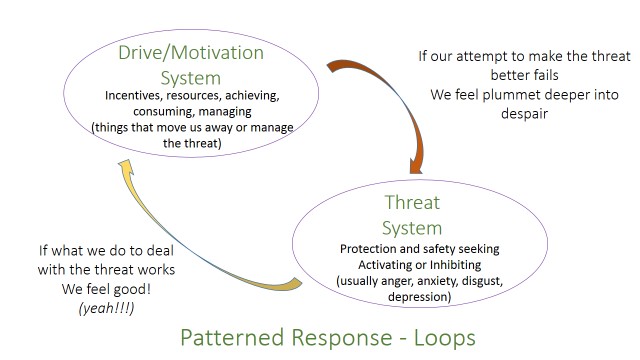27 Oct Compassionate Self. Contributions of Paul Gilbert
Just back, literally from the United Kingdom where I had the very good fortune to spend three days with Paul Gilbert in Derby. Over the years I have heard of this incredible innovator when I would teach in the UK and Ireland but I wanted more! So off I went to the Midlands of the United Kingdom to deepen my understanding of what this forerunner was saying in his modelCompassion Focused Therapy.
When I first heard Paul say this at a conference I was awed. What a way to completely validate experience and reality – the change process is encapsulated in this statement.
Whatever happened – happens – in our lives is not our fault. Paul makes the point that we have a tricky brain that is wired for survival. Wired to fight. To flee. To freeze if we can't fight or flight. Those brain circuits take over and run the show when we're in distress.
That we all have these systems hard wired into us is not our fault.
But, and this is the genius of Paul. It is our responsibility of how we act.
We might not be able to change it in the moment. Our bodies and brains might – well, actually – they will respond the way they do. But we can take responsibility for our brains and teach, train, guide, our brains into different pathways. Or to repair whatever rupture we have done.
It's not about blaming ourselves or heaping shame on ourselves, or shutting down to stop the feelings of distress. It's what we do with it that's important. It's about choosing our lives instead of being victimized by what happens to us.
Here's where compassion is so important.
We will do it wrong. We will make mistakes. We will say or do things that we regret. We will respond in ways that embarrasses us or even worse, shames us.
The response to that is what Paul's work is all about. How we respond to these patterns we have. How do we cultivate our compassionate self so that we can respond to ourselves, and to others, in ways that create a life that is more supportive and nourishing?
Paul points out that when our threat system is provoked we have a drive system in place that is designed to manage the horrible feelings/consequences that come. We all have our own versions of this, incentives, motivations, resources (internal and external) that we have fine-tuned to move, shift, alter our internal distress.
If it works, great. Whew. Distress avoided.
If it doesn't….. well we know what happens then. We end up feeling worse. Doubting the future. Confident that we're stuck in the muck. Caught. Never to be relieved of this.
Paul calls this the loops we get into. You've probably heard me refer to this as “patterns.”
So what's the way out? Are we doomed to this cycle?
The way out is by developing, cultivating a new way of being in life. This is where we have choice. We can choose to cultivate a new way of being, which is actually cultivating the seeds of our true nature.
We all have the capacity for goodness. We all have the capacity for kindness. For compassion.
Many of us have had to bury these qualities of our true nature out of hurt or disappointment. Yet if we cultivate these qualities in us we can antidote the distress and open the door to a way to be with our loops that changes the whole dynamic.
The distress might be there. But the way we are with the distress changes.

This is revolutionary.
Making life a different place to live in. Cultivating the compassionate self is what the Embodied Practices are about. It's what Paul's work is about. It's what the IFS model calls “Self Energy.”
All the models point us back to our true nature. It shifts our focus from what's wrong with me to generating a life which is more nourishing to live in.
I want to hear from you. What loops do you fall into? How do you manage your distress? Are there ways you use to cultivate your Compassionate Self? I love hearing from you. Comment below or email me directly.



